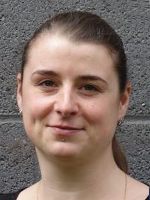Doctoral Candidate
Email: holzmann(at)uni-bremen.de
Academic Profile
Since 10/2015: Research Associate and Doctoral Candidate on the ERC Consolidator Grant project ‘The Holy Roman Empire of the German Nation and its Slaves’, University of Bremen
2011–14: Master of Arts in Early Modern History, Free University Berlin. Thesis topic: ‘Geselligkeit im 18. Jahrhundert am Beispiel der Selbstzeugnisse von Angelika Rosa und der Schwestern Swellengrebel’ (Eighteenth-Century Sociability in the Self-Narratives of Angelika Rosa and the Swellengrebel Sisters)
2013–15: Student Assistant to Prof. Claudia Jarzebowski, Free University Berlin
2013: Organisation of a student workshop on working with self-narratives as part of a tutorial on violence in the early modern period led by Eva Marie Lehner (University of Duisburg-Essen), Humboldt-Universität zu Berlin
2012/13: Study abroad semester, Utrecht University
2008–11: Bachelor of Arts in History and Art History, Free University Berlin
Thesis topic: ‘“[...] denn da ich von menschlichen Schwachheiten nicht frey bin, so mußten meine Leser doch wissen, wie das Glas gefärbt ist, durch welches ich gesehen habe.“ Georg Forsters (1754–1794) Konstruktion des Weiblichen’ (‘[...] as I am not free from human weakness, my readers must know, how the glass through which I saw was coloured.’ Georg Forster’s (1754–94) Construction of the Feminine)
2008: Student Assistant to Prof. Bernd Sösemann, Chair of the History of Public Communication, Free University Berlin
Current Project
In the center of my study is the question for slavery and trafficked and enslaved people in the geographical area of the Seven United Provinces of the Netherlands in the long 18th century. In common sense and also in some parts of research, it is assumed that slavery did not exist in the Netherlands during the early modern period. A praxeological and microhistorical method approach allows to evaluate previously unknown and almost unknown sources and to trace enslaved people in the Netherlands. Although the legal basis for slavery in the Netherlands was at first glance obscure, this legal ambiguity allowed and even legitimized slavery and similar constraints and dependencies. Starting from this legal situation, every day and socio-historical aspects of abduction and slavery in the Netherlands are examined. Who was enslaved? How did this enslavement look like? What scopes of action did the affected persons have in this field of tension between dependence and coercion? Etc. The sources used are often normative, but can be evaluated by qualitative analysis of people's practices and actions. Laws and regulations, court judgments, parish registers, but also wills and other notarial documents, transfer records of property, road passes, ship journals and also non-normative sources such as letters, testimonies and pictures come into view. The aim of the work is to make people and practices visible within these compulsions and dependencies, as well as their possibilities for action, thereby making the social significance of this phenomenon comprehensible.
Lectures
- Koloniale Herrschaft in komprimierter Form: Die Gouvernermentsjournale der niederländischen Kolonie Suriname im 18. Jahrhundert.“, Workshop: „Verzeichnispraktiken – frühneuzeitliche Register und Listen“, Universität Duisburg-Essen, organisiert von Stefan Brakensiek (Essen), Claudia Jarzebowski (Berlin), Eva Marie Lehner (Essen), 23.-24.11.2018.
- “Trafficked and Abused. Slavery in the Dutch Republic of the 18th Century.”, Emotion in Motion: Early Modern Families and Communities in Transnational and Global Historical Perspective, 24.–25.2018, Berlin Free University, 24. Mai 2018
- “Coming home? Slave children and youth and their (self)-perception in the Dutch context, 1600-1800“, SHCY 2017 CONFERENCE: Transition, Transaction, and Transgression, Rutgers University – Camden, New Jersey, 21. Juni 2017
- “Conflicts and Relations between Slavery, Dependency, Poverty and Coerced Labor in 18th Century Amsterdam – the Case Christina from India”, Negotiating Status and Scope of Action — Interrelations between Slavery and Other Forms of Dependency in Early Modern Europe, Universität Bremen, 15.–17. Juni 2017
- Gastvortrag an der Ruhr-Universität Bochum (Seminarleitung: Prof. Claudia Jarzebowski): Dutch Slavery in the 18th Century: Source Reading, 31. Oktober 2016
Paper
- Conflicts and Relations between Slavery, Dependency, Poverty and Coerced Labor in 18th Century Amsterdam – the Case Christina from India
„Koloniale Herrschaft in komprimierter Form: Die Gouvernermentsjournale der niederländischen Kolonie Suriname im 18. Jahrhundert.“
Workshop: „Verzeichnispraktiken – frühneuzeitliche Register und Listen“, Universität Duisburg-Essen, organisiert von Stefan Brakensiek (Essen), Claudia Jarzebowski (Berlin), Eva Marie Lehner (Essen), 23.-24.11.2018.



